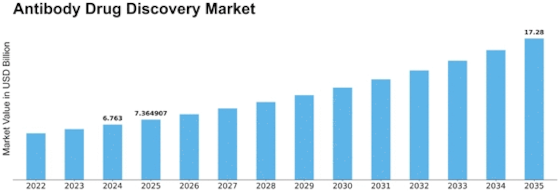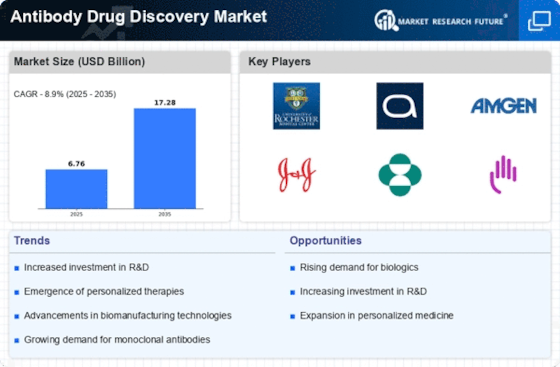Monoclonal Antibodies
Polyclonal Antibodies
Antibody-Drug Conjugates
Bispecific Antibodies
Recombinant DNA Technology
Hybridoma Technology
Phage Display Technology
Transgenic Technology
Therapeutic Applications
Diagnostic Applications
Research Applications
Pharmaceutical Companies
Biotechnology Companies
Research Institutions
North America
Europe
South America
Asia Pacific
Middle East and Africa
North America Outlook (USD Billion, 2019-2035)
Antibody Drug Discovery Market by Type
Monoclonal Antibodies
Polyclonal Antibodies
Antibody-Drug Conjugates
Bispecific Antibodies
Antibody Drug Discovery Market by Technology Type
Recombinant DNA Technology
Hybridoma Technology
Phage Display Technology
Transgenic Technology
Antibody Drug Discovery Market by Application Type
Therapeutic Applications
Diagnostic Applications
Research Applications
Antibody Drug Discovery Market by End Use Type
Pharmaceutical Companies
Biotechnology Companies
Research Institutions
Antibody Drug Discovery Market by Regional Type
US
Canada
US Outlook (USD Billion, 2019-2035)
Antibody Drug Discovery Market by Type
Monoclonal Antibodies
Polyclonal Antibodies
Antibody-Drug Conjugates
Bispecific Antibodies
Antibody Drug Discovery Market by Technology Type
Recombinant DNA Technology
Hybridoma Technology
Phage Display Technology
Transgenic Technology
Antibody Drug Discovery Market by Application Type
Therapeutic Applications
Diagnostic Applications
Research Applications
Antibody Drug Discovery Market by End Use Type
Pharmaceutical Companies
Biotechnology Companies
Research Institutions
CANADA Outlook (USD Billion, 2019-2035)
Antibody Drug Discovery Market by Type
Monoclonal Antibodies
Polyclonal Antibodies
Antibody-Drug Conjugates
Bispecific Antibodies
Antibody Drug Discovery Market by Technology Type
Recombinant DNA Technology
Hybridoma Technology
Phage Display Technology
Transgenic Technology
Antibody Drug Discovery Market by Application Type
Therapeutic Applications
Diagnostic Applications
Research Applications
Antibody Drug Discovery Market by End Use Type
Pharmaceutical Companies
Biotechnology Companies
Research Institutions
Europe Outlook (USD Billion, 2019-2035)
Antibody Drug Discovery Market by Type
Monoclonal Antibodies
Polyclonal Antibodies
Antibody-Drug Conjugates
Bispecific Antibodies
Antibody Drug Discovery Market by Technology Type
Recombinant DNA Technology
Hybridoma Technology
Phage Display Technology
Transgenic Technology
Antibody Drug Discovery Market by Application Type
Therapeutic Applications
Diagnostic Applications
Research Applications
Antibody Drug Discovery Market by End Use Type
Pharmaceutical Companies
Biotechnology Companies
Research Institutions
Antibody Drug Discovery Market by Regional Type
Germany
UK
France
Russia
Italy
Spain
Rest of Europe
GERMANY Outlook (USD Billion, 2019-2035)
Antibody Drug Discovery Market by Type
Monoclonal Antibodies
Polyclonal Antibodies
Antibody-Drug Conjugates
Bispecific Antibodies
Antibody Drug Discovery Market by Technology Type
Recombinant DNA Technology
Hybridoma Technology
Phage Display Technology
Transgenic Technology
Antibody Drug Discovery Market by Application Type
Therapeutic Applications
Diagnostic Applications
Research Applications
Antibody Drug Discovery Market by End Use Type
Pharmaceutical Companies
Biotechnology Companies
Research Institutions
UK Outlook (USD Billion, 2019-2035)
Antibody Drug Discovery Market by Type
Monoclonal Antibodies
Polyclonal Antibodies
Antibody-Drug Conjugates
Bispecific Antibodies
Antibody Drug Discovery Market by Technology Type
Recombinant DNA Technology
Hybridoma Technology
Phage Display Technology
Transgenic Technology
Antibody Drug Discovery Market by Application Type
Therapeutic Applications
Diagnostic Applications
Research Applications
Antibody Drug Discovery Market by End Use Type
Pharmaceutical Companies
Biotechnology Companies
Research Institutions
FRANCE Outlook (USD Billion, 2019-2035)
Antibody Drug Discovery Market by Type
Monoclonal Antibodies
Polyclonal Antibodies
Antibody-Drug Conjugates
Bispecific Antibodies
Antibody Drug Discovery Market by Technology Type
Recombinant DNA Technology
Hybridoma Technology
Phage Display Technology
Transgenic Technology
Antibody Drug Discovery Market by Application Type
Therapeutic Applications
Diagnostic Applications
Research Applications
Antibody Drug Discovery Market by End Use Type
Pharmaceutical Companies
Biotechnology Companies
Research Institutions
RUSSIA Outlook (USD Billion, 2019-2035)
Antibody Drug Discovery Market by Type
Monoclonal Antibodies
Polyclonal Antibodies
Antibody-Drug Conjugates
Bispecific Antibodies
Antibody Drug Discovery Market by Technology Type
Recombinant DNA Technology
Hybridoma Technology
Phage Display Technology
Transgenic Technology
Antibody Drug Discovery Market by Application Type
Therapeutic Applications
Diagnostic Applications
Research Applications
Antibody Drug Discovery Market by End Use Type
Pharmaceutical Companies
Biotechnology Companies
Research Institutions
ITALY Outlook (USD Billion, 2019-2035)
Antibody Drug Discovery Market by Type
Monoclonal Antibodies
Polyclonal Antibodies
Antibody-Drug Conjugates
Bispecific Antibodies
Antibody Drug Discovery Market by Technology Type
Recombinant DNA Technology
Hybridoma Technology
Phage Display Technology
Transgenic Technology
Antibody Drug Discovery Market by Application Type
Therapeutic Applications
Diagnostic Applications
Research Applications
Antibody Drug Discovery Market by End Use Type
Pharmaceutical Companies
Biotechnology Companies
Research Institutions
SPAIN Outlook (USD Billion, 2019-2035)
Antibody Drug Discovery Market by Type
Monoclonal Antibodies
Polyclonal Antibodies
Antibody-Drug Conjugates
Bispecific Antibodies
Antibody Drug Discovery Market by Technology Type
Recombinant DNA Technology
Hybridoma Technology
Phage Display Technology
Transgenic Technology
Antibody Drug Discovery Market by Application Type
Therapeutic Applications
Diagnostic Applications
Research Applications
Antibody Drug Discovery Market by End Use Type
Pharmaceutical Companies
Biotechnology Companies
Research Institutions
REST OF EUROPE Outlook (USD Billion, 2019-2035)
Antibody Drug Discovery Market by Type
Monoclonal Antibodies
Polyclonal Antibodies
Antibody-Drug Conjugates
Bispecific Antibodies
Antibody Drug Discovery Market by Technology Type
Recombinant DNA Technology
Hybridoma Technology
Phage Display Technology
Transgenic Technology
Antibody Drug Discovery Market by Application Type
Therapeutic Applications
Diagnostic Applications
Research Applications
Antibody Drug Discovery Market by End Use Type
Pharmaceutical Companies
Biotechnology Companies
Research Institutions
APAC Outlook (USD Billion, 2019-2035)
Antibody Drug Discovery Market by Type
Monoclonal Antibodies
Polyclonal Antibodies
Antibody-Drug Conjugates
Bispecific Antibodies
Antibody Drug Discovery Market by Technology Type
Recombinant DNA Technology
Hybridoma Technology
Phage Display Technology
Transgenic Technology
Antibody Drug Discovery Market by Application Type
Therapeutic Applications
Diagnostic Applications
Research Applications
Antibody Drug Discovery Market by End Use Type
Pharmaceutical Companies
Biotechnology Companies
Research Institutions
Antibody Drug Discovery Market by Regional Type
China
India
Japan
South Korea
Malaysia
Thailand
Indonesia
Rest of APAC
CHINA Outlook (USD Billion, 2019-2035)
Antibody Drug Discovery Market by Type
Monoclonal Antibodies
Polyclonal Antibodies
Antibody-Drug Conjugates
Bispecific Antibodies
Antibody Drug Discovery Market by Technology Type
Recombinant DNA Technology
Hybridoma Technology
Phage Display Technology
Transgenic Technology
Antibody Drug Discovery Market by Application Type
Therapeutic Applications
Diagnostic Applications
Research Applications
Antibody Drug Discovery Market by End Use Type
Pharmaceutical Companies
Biotechnology Companies
Research Institutions
INDIA Outlook (USD Billion, 2019-2035)
Antibody Drug Discovery Market by Type
Monoclonal Antibodies
Polyclonal Antibodies
Antibody-Drug Conjugates
Bispecific Antibodies
Antibody Drug Discovery Market by Technology Type
Recombinant DNA Technology
Hybridoma Technology
Phage Display Technology
Transgenic Technology
Antibody Drug Discovery Market by Application Type
Therapeutic Applications
Diagnostic Applications
Research Applications
Antibody Drug Discovery Market by End Use Type
Pharmaceutical Companies
Biotechnology Companies
Research Institutions
JAPAN Outlook (USD Billion, 2019-2035)
Antibody Drug Discovery Market by Type
Monoclonal Antibodies
Polyclonal Antibodies
Antibody-Drug Conjugates
Bispecific Antibodies
Antibody Drug Discovery Market by Technology Type
Recombinant DNA Technology
Hybridoma Technology
Phage Display Technology
Transgenic Technology
Antibody Drug Discovery Market by Application Type
Therapeutic Applications
Diagnostic Applications
Research Applications
Antibody Drug Discovery Market by End Use Type
Pharmaceutical Companies
Biotechnology Companies
Research Institutions
SOUTH KOREA Outlook (USD Billion, 2019-2035)
Antibody Drug Discovery Market by Type
Monoclonal Antibodies
Polyclonal Antibodies
Antibody-Drug Conjugates
Bispecific Antibodies
Antibody Drug Discovery Market by Technology Type
Recombinant DNA Technology
Hybridoma Technology
Phage Display Technology
Transgenic Technology
Antibody Drug Discovery Market by Application Type
Therapeutic Applications
Diagnostic Applications
Research Applications
Antibody Drug Discovery Market by End Use Type
Pharmaceutical Companies
Biotechnology Companies
Research Institutions
MALAYSIA Outlook (USD Billion, 2019-2035)
Antibody Drug Discovery Market by Type
Monoclonal Antibodies
Polyclonal Antibodies
Antibody-Drug Conjugates
Bispecific Antibodies
Antibody Drug Discovery Market by Technology Type
Recombinant DNA Technology
Hybridoma Technology
Phage Display Technology
Transgenic Technology
Antibody Drug Discovery Market by Application Type
Therapeutic Applications
Diagnostic Applications
Research Applications
Antibody Drug Discovery Market by End Use Type
Pharmaceutical Companies
Biotechnology Companies
Research Institutions
THAILAND Outlook (USD Billion, 2019-2035)
Antibody Drug Discovery Market by Type
Monoclonal Antibodies
Polyclonal Antibodies
Antibody-Drug Conjugates
Bispecific Antibodies
Antibody Drug Discovery Market by Technology Type
Recombinant DNA Technology
Hybridoma Technology
Phage Display Technology
Transgenic Technology
Antibody Drug Discovery Market by Application Type
Therapeutic Applications
Diagnostic Applications
Research Applications
Antibody Drug Discovery Market by End Use Type
Pharmaceutical Companies
Biotechnology Companies
Research Institutions
INDONESIA Outlook (USD Billion, 2019-2035)
Antibody Drug Discovery Market by Type
Monoclonal Antibodies
Polyclonal Antibodies
Antibody-Drug Conjugates
Bispecific Antibodies
Antibody Drug Discovery Market by Technology Type
Recombinant DNA Technology
Hybridoma Technology
Phage Display Technology
Transgenic Technology
Antibody Drug Discovery Market by Application Type
Therapeutic Applications
Diagnostic Applications
Research Applications
Antibody Drug Discovery Market by End Use Type
Pharmaceutical Companies
Biotechnology Companies
Research Institutions
REST OF APAC Outlook (USD Billion, 2019-2035)
Antibody Drug Discovery Market by Type
Monoclonal Antibodies
Polyclonal Antibodies
Antibody-Drug Conjugates
Bispecific Antibodies
Antibody Drug Discovery Market by Technology Type
Recombinant DNA Technology
Hybridoma Technology
Phage Display Technology
Transgenic Technology
Antibody Drug Discovery Market by Application Type
Therapeutic Applications
Diagnostic Applications
Research Applications
Antibody Drug Discovery Market by End Use Type
Pharmaceutical Companies
Biotechnology Companies
Research Institutions
South America Outlook (USD Billion, 2019-2035)
Antibody Drug Discovery Market by Type
Monoclonal Antibodies
Polyclonal Antibodies
Antibody-Drug Conjugates
Bispecific Antibodies
Antibody Drug Discovery Market by Technology Type
Recombinant DNA Technology
Hybridoma Technology
Phage Display Technology
Transgenic Technology
Antibody Drug Discovery Market by Application Type
Therapeutic Applications
Diagnostic Applications
Research Applications
Antibody Drug Discovery Market by End Use Type
Pharmaceutical Companies
Biotechnology Companies
Research Institutions
Antibody Drug Discovery Market by Regional Type
Brazil
Mexico
Argentina
Rest of South America
BRAZIL Outlook (USD Billion, 2019-2035)
Antibody Drug Discovery Market by Type
Monoclonal Antibodies
Polyclonal Antibodies
Antibody-Drug Conjugates
Bispecific Antibodies
Antibody Drug Discovery Market by Technology Type
Recombinant DNA Technology
Hybridoma Technology
Phage Display Technology
Transgenic Technology
Antibody Drug Discovery Market by Application Type
Therapeutic Applications
Diagnostic Applications
Research Applications
Antibody Drug Discovery Market by End Use Type
Pharmaceutical Companies
Biotechnology Companies
Research Institutions
MEXICO Outlook (USD Billion, 2019-2035)
Antibody Drug Discovery Market by Type
Monoclonal Antibodies
Polyclonal Antibodies
Antibody-Drug Conjugates
Bispecific Antibodies
Antibody Drug Discovery Market by Technology Type
Recombinant DNA Technology
Hybridoma Technology
Phage Display Technology
Transgenic Technology
Antibody Drug Discovery Market by Application Type
Therapeutic Applications
Diagnostic Applications
Research Applications
Antibody Drug Discovery Market by End Use Type
Pharmaceutical Companies
Biotechnology Companies
Research Institutions
ARGENTINA Outlook (USD Billion, 2019-2035)
Antibody Drug Discovery Market by Type
Monoclonal Antibodies
Polyclonal Antibodies
Antibody-Drug Conjugates
Bispecific Antibodies
Antibody Drug Discovery Market by Technology Type
Recombinant DNA Technology
Hybridoma Technology
Phage Display Technology
Transgenic Technology
Antibody Drug Discovery Market by Application Type
Therapeutic Applications
Diagnostic Applications
Research Applications
Antibody Drug Discovery Market by End Use Type
Pharmaceutical Companies
Biotechnology Companies
Research Institutions
REST OF SOUTH AMERICA Outlook (USD Billion, 2019-2035)
Antibody Drug Discovery Market by Type
Monoclonal Antibodies
Polyclonal Antibodies
Antibody-Drug Conjugates
Bispecific Antibodies
Antibody Drug Discovery Market by Technology Type
Recombinant DNA Technology
Hybridoma Technology
Phage Display Technology
Transgenic Technology
Antibody Drug Discovery Market by Application Type
Therapeutic Applications
Diagnostic Applications
Research Applications
Antibody Drug Discovery Market by End Use Type
Pharmaceutical Companies
Biotechnology Companies
Research Institutions
MEA Outlook (USD Billion, 2019-2035)
Antibody Drug Discovery Market by Type
Monoclonal Antibodies
Polyclonal Antibodies
Antibody-Drug Conjugates
Bispecific Antibodies
Antibody Drug Discovery Market by Technology Type
Recombinant DNA Technology
Hybridoma Technology
Phage Display Technology
Transgenic Technology
Antibody Drug Discovery Market by Application Type
Therapeutic Applications
Diagnostic Applications
Research Applications
Antibody Drug Discovery Market by End Use Type
Pharmaceutical Companies
Biotechnology Companies
Research Institutions
Antibody Drug Discovery Market by Regional Type
GCC Countries
South Africa
Rest of MEA
GCC COUNTRIES Outlook (USD Billion, 2019-2035)
Antibody Drug Discovery Market by Type
Monoclonal Antibodies
Polyclonal Antibodies
Antibody-Drug Conjugates
Bispecific Antibodies
Antibody Drug Discovery Market by Technology Type
Recombinant DNA Technology
Hybridoma Technology
Phage Display Technology
Transgenic Technology
Antibody Drug Discovery Market by Application Type
Therapeutic Applications
Diagnostic Applications
Research Applications
Antibody Drug Discovery Market by End Use Type
Pharmaceutical Companies
Biotechnology Companies
Research Institutions
SOUTH AFRICA Outlook (USD Billion, 2019-2035)
Antibody Drug Discovery Market by Type
Monoclonal Antibodies
Polyclonal Antibodies
Antibody-Drug Conjugates
Bispecific Antibodies
Antibody Drug Discovery Market by Technology Type
Recombinant DNA Technology
Hybridoma Technology
Phage Display Technology
Transgenic Technology
Antibody Drug Discovery Market by Application Type
Therapeutic Applications
Diagnostic Applications
Research Applications
Antibody Drug Discovery Market by End Use Type
Pharmaceutical Companies
Biotechnology Companies
Research Institutions
REST OF MEA Outlook (USD Billion, 2019-2035)
Antibody Drug Discovery Market by Type
Monoclonal Antibodies
Polyclonal Antibodies
Antibody-Drug Conjugates
Bispecific Antibodies
Antibody Drug Discovery Market by Technology Type
Recombinant DNA Technology
Hybridoma Technology
Phage Display Technology
Transgenic Technology
Antibody Drug Discovery Market by Application Type
Therapeutic Applications
Diagnostic Applications
Research Applications
Antibody Drug Discovery Market by End Use Type
Pharmaceutical Companies
Biotechnology Companies
Research Institutions



















Leave a Comment